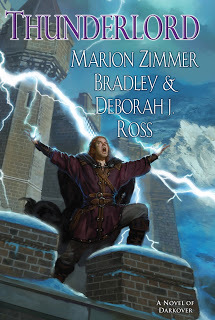Deborah J. Ross's Blog, page 106
August 19, 2016
Auntie Deborah Answers Questions on Writing
 Q: What advice would you give an aspiring young writer?A: There are a gazillion tips on how to write, how not to write, do’s and don’ts galore. The best advice I can give to a young author is to fill your life up with experiences. You aren’t fully formed yet, either as a person or as a writer. So go have adventures; read widely; learn a second or third language; play a musical instrument; dance; study cultures other than your own, history, psychology, sociology, comparative religion, music theory. Anything and everything that interests you. Make friends who come from different backgrounds and listen to their stories with an open heart. Fill up your creative storehouse so that you will have something worth writing about.In school, we learn how to write literate English (at least that’s the goal). We may analyze English literature, but usually the focus on reading comprehension not the mechanics of fiction. That often creates the illusion that we do or should know how to write effective fiction. That’s a bit like saying that because you can drive a car, you know how to build one from scratch. To create an inspiring story, you need a tool kit and skills. The tool kit includes a deep understanding of how and why stories move us, a wide range of life experiences (the raw material), and the basic mechanics of prose narration (exposition, dialog, theme and metatheme, rising tension that leads to climax and resolution, world-building, sympathetic characters, etc.) The skills are how to put together all these elements, when to introduce them or remind the reader, that sort of thing. There are perhaps as many ways of learning those skills as there are writers. Some benefit from reading widely and mindfully across a range of the best literature they can find. Others respond to “how to” books like John Gardner’s The Art of Fiction or Damon Knight’s Creating Short Fiction. Still others do better with hands-on critiques and explanations (when I was a new writer, I had to have things explained to me in words of one syllable).Q: What mistakes do new writers make?A: There are a gazillion lists of specific faults in prose (such as grammar and punctuation) or story craft (such as the rise and resolution of tension). A new writer can get so overwhelmed by “dos and don’ts,” she ends up paralyzed.So I’d like to take a different tack and suggest that new writers learn to trust their readers. Trust them to figure things out. Trust them to read intelligently and sensitively. Most of all, trust them to experience the story for themselves. If there’s a “don’t” here, it’s don’t tell the reader how to feel. Take the reader on a journey that will be different for each reader because no two of us are alike in temperament and experiences. Give them what they need to know what’s going on, but allow the story to flow through them, seen through the lens of their own lives. At the same time, play fair with your reader. That means no surprise out-of-nowhere endings that have nothing to do with the meat of the story. If you set up expectations for one kind of story, hard-boiled noir detective, for example, it’s not a good idea to switch to a fluffy sweet romance. You and the reader have an agreement: “Give me x hours of your time, and this is the reading experience I promise you.” Just as a new writer must learn to trust her readers, she herself must be trustworthy in fulfilling that promise.
Q: What advice would you give an aspiring young writer?A: There are a gazillion tips on how to write, how not to write, do’s and don’ts galore. The best advice I can give to a young author is to fill your life up with experiences. You aren’t fully formed yet, either as a person or as a writer. So go have adventures; read widely; learn a second or third language; play a musical instrument; dance; study cultures other than your own, history, psychology, sociology, comparative religion, music theory. Anything and everything that interests you. Make friends who come from different backgrounds and listen to their stories with an open heart. Fill up your creative storehouse so that you will have something worth writing about.In school, we learn how to write literate English (at least that’s the goal). We may analyze English literature, but usually the focus on reading comprehension not the mechanics of fiction. That often creates the illusion that we do or should know how to write effective fiction. That’s a bit like saying that because you can drive a car, you know how to build one from scratch. To create an inspiring story, you need a tool kit and skills. The tool kit includes a deep understanding of how and why stories move us, a wide range of life experiences (the raw material), and the basic mechanics of prose narration (exposition, dialog, theme and metatheme, rising tension that leads to climax and resolution, world-building, sympathetic characters, etc.) The skills are how to put together all these elements, when to introduce them or remind the reader, that sort of thing. There are perhaps as many ways of learning those skills as there are writers. Some benefit from reading widely and mindfully across a range of the best literature they can find. Others respond to “how to” books like John Gardner’s The Art of Fiction or Damon Knight’s Creating Short Fiction. Still others do better with hands-on critiques and explanations (when I was a new writer, I had to have things explained to me in words of one syllable).Q: What mistakes do new writers make?A: There are a gazillion lists of specific faults in prose (such as grammar and punctuation) or story craft (such as the rise and resolution of tension). A new writer can get so overwhelmed by “dos and don’ts,” she ends up paralyzed.So I’d like to take a different tack and suggest that new writers learn to trust their readers. Trust them to figure things out. Trust them to read intelligently and sensitively. Most of all, trust them to experience the story for themselves. If there’s a “don’t” here, it’s don’t tell the reader how to feel. Take the reader on a journey that will be different for each reader because no two of us are alike in temperament and experiences. Give them what they need to know what’s going on, but allow the story to flow through them, seen through the lens of their own lives. At the same time, play fair with your reader. That means no surprise out-of-nowhere endings that have nothing to do with the meat of the story. If you set up expectations for one kind of story, hard-boiled noir detective, for example, it’s not a good idea to switch to a fluffy sweet romance. You and the reader have an agreement: “Give me x hours of your time, and this is the reading experience I promise you.” Just as a new writer must learn to trust her readers, she herself must be trustworthy in fulfilling that promise.Q: How do you build a science fictional world -- the prospect is overwhelming!
A: The most important thing to understand about world-building is that not every writer does it in the same way. For some, it’s important to have that world fully realized in every detail and all the technology and science worked out before beginning to write. Others begin with a character or plot idea and let the landscape unfold as they explore it. I’m in the latter camp: I often don’t know what questions to ask when I begin a project, but they become clear to me once I start developing those characters and human dilemmas. I end up pausing to do research and map things out in rough draft or outline stage. I used to feel overwhelmed by the notion that I had to know everything first, and only when I understood my own creative process did I follow my intuition and let my stories grow organically.
P.S. My science fiction has been praised for its world-building. So it doesn’t matter how you get there!
Q: What should I keep in mind when starting a science fiction novel?A: I’d give the same advice to a beginning writer of any genre, including mainstream. Write the best stories you can. The same principles of effective prose and storytelling apply, no matter what type of story it is. Keep pushing your literary craft. Read the best literature you can get your hands on and critically analyze what makes it work.Of course, you have to do your homework when it comes to science and technology, but also world-building that includes culture, linguistics, sociology, etc. But so does every writer.
Q: Why are books for young people popular when they're not well written?A: I notice that you are referring to the books your kids read. Kids and adults read for different reasons. Children have not yet developed internal critics, they suspend disbelief readily, and they respond powerfully to tropes that leave adults cold. By trope I mean a motif, device, or cliche that has psychological resonance, for example in Harry Potter, you see The Worthy Orphan, The Prince in Waiting (The Chosen One), The Wise Old Mentor, as well as a school story and The Adventures of Friends. Kids also love stories in which the young protagonists have agency, the ability to have adventures they could never experience in their own lives. All of these things are more important to young readers (and many adult readers!) than literary quality.
Q: How do you write a novel?A: A crucial part of writing a novel is discerning when you have a novel-sized idea, as opposed to one more suitable for a novella or short story. In order to carry the weight of 100K words, the concept of a novel must have depth and emotional resonance. It must be capable of maintaining tension and forward propulsion, and spinning off subplots that enhance rather than distract from the central theme.Sometimes I’ll start with a notion (or character or line of dialog or scene) and let it play out in my imagination to see how it develops. In the first decade or so of writing professionally, I’d make mistakes, trying to squash a huge idea into 5K words or, conversely, to stretch out a single gem-perfect nugget into many chapters. But I learned by stepping back and identifying the skills I needed. Now I’m usually accurate (and with short fiction, I can tell within 1K words how long the story will be). That said, there are a gazillion ways to structure, plan, and actually write a novel. Since there’s no right or wrong way, only the final product, you can find what works best for you.
Q: What's the best advice about writing you've ever received?A: The best advice I ever received came from my mentor. She encouraged me to “play it out,” meaning to explore all the nuances and emotional beats of a dramatic scene. Like many newer writers, I built up to those scenes and then rushed through them, thinking that if the action was happening very fast, so should the scene. I thought that I’d set up all the pieces so the reader would realize their importance when they came together. But really, I was selling my readers short. I didn’t realize that the more action, tension, and emotional weight a scene has, the longer it can — and should — be. Readers want to savor every moment, every breath of breathless action. They don’t want to have pages and pages of not-much-happening and then something incredibly important in a paragraph.

Published on August 19, 2016 11:30
August 15, 2016
Book Review: Small Great Things by Jodi Picoult
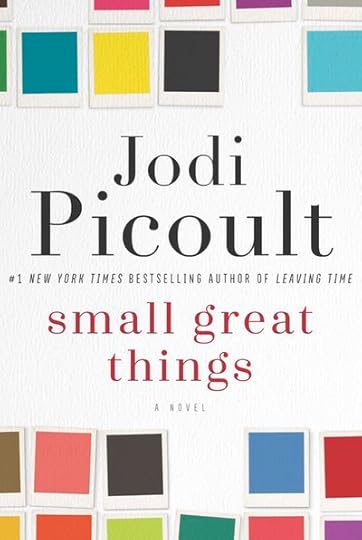 From the very first page of Small Great Things by Jodi Picoult (Random House, October 2016), I knew that I was in the hands of a master storyteller, one who would effortlessly guide me into the lives of her characters, with all their unexpected twists and turns, without a single jolt or bump in the road that was not intentional and expertly handled. Very early in the book, I kept thinking what it must have been like to read To Kill a Mockingbird by Harper Lee for the very first time, without knowing how it was going to turn out. I am a little leery of applying superlatives to a work which has not yet withstood the test of time, but I would be surprised if Small Great Things does not have the same impact and enduring popularity. Picoult has taken one of the defining issues of our age and woven it into a story with universal appeal.
From the very first page of Small Great Things by Jodi Picoult (Random House, October 2016), I knew that I was in the hands of a master storyteller, one who would effortlessly guide me into the lives of her characters, with all their unexpected twists and turns, without a single jolt or bump in the road that was not intentional and expertly handled. Very early in the book, I kept thinking what it must have been like to read To Kill a Mockingbird by Harper Lee for the very first time, without knowing how it was going to turn out. I am a little leery of applying superlatives to a work which has not yet withstood the test of time, but I would be surprised if Small Great Things does not have the same impact and enduring popularity. Picoult has taken one of the defining issues of our age and woven it into a story with universal appeal.The book begins simply with a day in the life of woman who has attained a high degree of skill and no small amount of professional recognition. Ruth is a labor and delivery nurse with over twenty years of experience, who enjoys the respect of her colleagues and the gratitude and trust of her patients. She is rightly proud of her educational achievements, being the daughter of a housekeeper who has spent her entire life in sacrifice and hard work so that her children might know a better life. All goes smoothly, with mothers giving birth and babies being evaluated, until Ruth and the reader are taken by surprise when two young parents of a newborn react to her performance of her duties with antagonism. Soon Ruth is forbidden to care for the baby and finds herself in the untenable position of obeying those instructions from her supervisor or standing by when the baby stops breathing. Ruth’s dilemma soon becomes a moot point when, despite her heroic intervention and that of the hospital pediatrician and her fellow nurses, the baby dies.
Now comes the conflict that will furnish the emotional and political driving force of this book: Ruth is black and the parents of the unfortunate baby are not only white, they are racist skinheads of the most violent sort. Unable to cope with the loss of their baby, they bring charges that quickly result in Ruth being charged with murder.
The second viewpoint character is the husband of this couple, and I cannot begin to tell you how much I did not want to be inside his head. From beginning to end, I found his behavior inexcusable and reprehensible, but I must acknowledge that such people exist. It seems that every few days I read a story in the news of some outrage perpetrated by people like him. They may not call themselves white supremacists or skinheads, but they promulgate the same vile philosophy. As I was reading this book, I saw a clip on social media of a young white woman screaming racist epithets at a black person. In Picoult’s book such people have not disappeared simply because they are not in the news. They have changed tactics, using the internet and coded language to disguise their agenda. Their hatred extends also to guys, immigrants, Jews, and many others, but in this story it is directed with full force against black people.
With sensitivity, insight, and consummate skill, Picoult examines the question of whether a white person — in this case Kennedy, the public defender who represents Ruth — can ever understand what it is like to be black in America. The author herself acknowledges the limitations of any story that is told by an outsider. Perhaps the most moving parts of the book center around the struggles of Ruth and Kennedy — to understand and to be understood. Kennedy’s initial priority, based on her legal expertise, is Ruth’s acquittal, and her strategy calls for ignoring the racial aspects of the charges to focus purely on the medical and legal. But is it possible to ignore the elephant in the middle of the living room — the reality that race can and does color every aspect our society? Given that truth, what must we — black and white and every color in between — do to overcome it?

Published on August 15, 2016 15:45
August 12, 2016
Supporting a New Writer 1: Introduction
Recently, I received this letter from Wendy, a fan with whom I’d been corresponding. It spoke deeply to me, and rather than answer it alone, I asked some of my writer friends to join in a series of round table blogs on the issues raised. If you’ve been there, too, I hope you’ll follow along and offer your own wisdom.
Effie Seiberg: I hear you. Writing is such an inherently lonely business, spending that much time in your own head, that a good support group is critical. When I first started writing I went though wild mood swings ranging from "OMG this is the most hilarious thing ever" to "Why did I ever think I could English? This is total crap," and I began to fear that I wasn't emotionally stable enough to write. It was only after I found a community of supportive writers that I understood that this is just how writing works, and the only thing that improves is your ability to enjoy the highs and survive the lows. A good support group bolsters you through both.
Effie Seiberg is a fantasy and science fiction writer. Her stories can be found in the "Women Destroy Science Fiction!" special edition of Lightspeed Magazine (winner of the 2015 British Fantasy Award for Best Anthology), Galaxy's Edge, Analog, Fireside Fiction, and PodCastle, amongst others. She is a graduate of Taos Toolbox 2013, a member of SFWA and Codex, and a reader at Tor.com. She lives in San Francisco, recently and upcoming (but not presently) near a giant sculpture of a pink bunny head with a skull in its mouth. She likes to make sculpted cakes and bad puns. You can follow her on twitter at @effies, or read more of her work at www.effieseiberg.com.
Science Fiction!" special edition of Lightspeed Magazine (winner of the 2015 British Fantasy Award for Best Anthology), Galaxy's Edge, Analog, Fireside Fiction, and PodCastle, amongst others. She is a graduate of Taos Toolbox 2013, a member of SFWA and Codex, and a reader at Tor.com. She lives in San Francisco, recently and upcoming (but not presently) near a giant sculpture of a pink bunny head with a skull in its mouth. She likes to make sculpted cakes and bad puns. You can follow her on twitter at @effies, or read more of her work at www.effieseiberg.com.
Barb Caffrey: For now, though...I can say this much to Wendy. It's never too late to do what you feel you must, as a creative artist. I have often felt like it's too late for me due to how my husband passed away suddenly; I'm now trying to carry on his work, and mine, and sometimes this seems like an overly heavy weight.
The important thing is that I'm doing it. No matter how long it takes, no matter what is up against me -- bad health or family health issues or foreclosures or anything -- I keep on working. Some days, all I can do is look at my works-in-progress and say, "Hmmm," and do a little fiddling but add nothing tangible. The next day, or maybe the day after that, the dam bursts and I have more new words again.
 The most important thing you can do -- and it unfortunately is also the hardest -- is to believe in yourself, and that what you are doing is valuable. No matter what anyone else says, no matter what anyone else does, you are going to do what you feel you must.
The most important thing you can do -- and it unfortunately is also the hardest -- is to believe in yourself, and that what you are doing is valuable. No matter what anyone else says, no matter what anyone else does, you are going to do what you feel you must.
I wish I had a better answer, but persistence has mostly worked for me.
Barb Caffrey has written three novels, An Elfy On The Loose(2014), A Little Elfy in Big Trouble (2015), and Changing Faces (forthcoming), and is the co-writer of the Adventures of Joey Maverick series (with late husband Michael B. Caffrey) Previous stories and poems have appeared in Stars Of Darkover, First Contact Café, How Beer Saved The World, Bearing North, and Bedlam's Edge (with Michael B. Caffrey).
Alma Alexander: I'm roughly of an age with you, Wendy, and I think ours is now the generation which has to grapple with some of life's truths. I’m technically only "half" an orphan at this point - my dad left us three years ago, my mother is still around, in her eighties now, frailer and more fragile than she's ever been before, both physically and psychologically, and it's something that it's up to me to deal with, I am in full defend and protect mode with her, often, and it takes up a huge swathe of mental and physical resources. But there will come a time when she too is gone and at this point it will be as you say - the foundation is gone. Until that moment you can always "go home". Afterwards, that first home, the foundation home, is gone, forever, and it takes a shift of thinking to adjust to it. So before anything else is said... there's that. There's the acknoledgment, and the understanding. We've been here, or we're coming up on that milestone, and we can look into that shadow and know exactly where you're coming from.
You haven't said if you've pursued your writing before in any focused way other than it having been a dream of yours - you use air quotes around your "career" so I don't know if you tried, and didn't meet with immediate success, and that was why you took the hiatus, or if your fears of not succeeding have prevented you from trying at all. But the first thing that needs to be said is something I've been telling people for a long time. If you want to be a writer, nobody can stop you. If you don't, then nobody can help you. The first impetus, the first urge, the first passion, the first demand, must come from within. If this is your dream, then even if you cannot lay aside your fears you must learn to write while juggling them with your other hand. Do you have stories whispering in your ear as you fall asleep at night, stories that desperately want to be told? Then tell them. At this point, pursuing your dream to the point of a "career" (and now I am using the air quotes) starts with the first step of actually sitting down, and writing. Something. Anything. Starting with an audience of one, yourself. THEN, you build out.
Alma Alexander is a novelist, anthologist and short story writer who currently shares her life between the Pacific Northwest of the USA (where she lives with her husband and two cats) and the wonderful fantasy worlds of her own imagination. Born in a country which no longer exists on the maps, she has lived and worked in seven countries on four continents (and in cyberspace!), and the story of her life so far has included climbing mountains, diving in coral reefs, flying small planes, swimming with dolphins, touching two-thousand-year-old tiles in a gate out of Babylon.
Pat Rice: After thirty plus years of publication, I’m here to tell you that doubt and negativity never go away. First, we have to accept that self-doubt is part of our process, decide our goals are more important than our fears, and push on to the next step. For most of us, the next step is to write. Write and write some more. Throw out the first efforts and start over, because we all have to learn somehow, and it’s fine not to be perfect.
Support groups can be useful, but they’re only what you make of them. You can go to meetings and talk about your goals and expectations and brainstorm your plots. You can listen to others speak of their failures and successes. The camaraderie and support is often necessary -- but it won’t get you to your goal unless you take that energy back to your computer and WRITE.
Thirty years ago when I was lost in the wilderness of doubt, I turned to Writers Market magazine for advice. These days, advice, critique groups, support groups, and everything you might need are all online. You can check Romance Writers of America’s website for the nearest chapter if you need to meet in person. The greater risk is that you’ll get lost in the mass of voices.
So my advice would be to support yourself first. Make the choice to write, find a time of day or grab whatever free minutes are available and scribble down your stories. Do it every day. Feel free to throw it out every night. You are building a habit that will build a career. When you are finally ready to invest in yourself, then look for others who can read what you’ve written and encourage you. And if they try to discourage you, go back and read what you have and decide for yourself whether they're right or not.
It takes a spine of steel and the perseverance of a saint to be a writer. It’s never too late to exercise and put those muscles into shape.
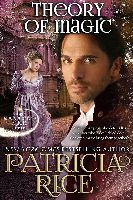 With several million books in print and New York Times and USA Today’s bestseller lists under her belt, former CPA Patricia Rice writes romance, mystery, and urban fantasy. Her books have won numerous awards, including the RT Book Reviews Reviewers Choice and Career Achievement Awards. She has also been honored as a Romance Writers of America RITA® finalist in the historical, regency and contemporary categories.
With several million books in print and New York Times and USA Today’s bestseller lists under her belt, former CPA Patricia Rice writes romance, mystery, and urban fantasy. Her books have won numerous awards, including the RT Book Reviews Reviewers Choice and Career Achievement Awards. She has also been honored as a Romance Writers of America RITA® finalist in the historical, regency and contemporary categories.

I've been trying to reconnect with writing friends after a hiatus from the creative life. I've spent the past year or so taking care of my mom and working to pay the bills. Mom passed away in October.
When your last parent passes away, it changes you in many ways. That foundation you always relied on -- even as an adult -- is gone for good. Whether you're ready or not, you are truly on your own in the world and must somehow carry on without their nurturing presence. One of the most difficult aspects of my mother's final days was the fact that she had so many regrets about life. She once had goals and dreams, but left them behind out of fear and a belief that these dreams were just not possible.
I'm 54 years old. More than half of my life is over. Writing has been a dream/goal of mine since childhood. My mom was the only one who believed in me. I don't want to leave this world regretting the fact that I never pursued this dream to the fullest. To be honest, my writing "career" never took off. I let fear, doubt and the negativity of others keep me from my dreams. I want so much to be brave, to take risks with my creative life. I truly wish for a group of fellow writers who are willing to give me the encouragement and support I need to write with my heart and soul, to grow as a writer and a human being. And I want to be a support for others as well.
How do I get back into the writing life after leaving it on the back burner for so long?
Effie Seiberg: I hear you. Writing is such an inherently lonely business, spending that much time in your own head, that a good support group is critical. When I first started writing I went though wild mood swings ranging from "OMG this is the most hilarious thing ever" to "Why did I ever think I could English? This is total crap," and I began to fear that I wasn't emotionally stable enough to write. It was only after I found a community of supportive writers that I understood that this is just how writing works, and the only thing that improves is your ability to enjoy the highs and survive the lows. A good support group bolsters you through both.
Effie Seiberg is a fantasy and science fiction writer. Her stories can be found in the "Women Destroy
 Science Fiction!" special edition of Lightspeed Magazine (winner of the 2015 British Fantasy Award for Best Anthology), Galaxy's Edge, Analog, Fireside Fiction, and PodCastle, amongst others. She is a graduate of Taos Toolbox 2013, a member of SFWA and Codex, and a reader at Tor.com. She lives in San Francisco, recently and upcoming (but not presently) near a giant sculpture of a pink bunny head with a skull in its mouth. She likes to make sculpted cakes and bad puns. You can follow her on twitter at @effies, or read more of her work at www.effieseiberg.com.
Science Fiction!" special edition of Lightspeed Magazine (winner of the 2015 British Fantasy Award for Best Anthology), Galaxy's Edge, Analog, Fireside Fiction, and PodCastle, amongst others. She is a graduate of Taos Toolbox 2013, a member of SFWA and Codex, and a reader at Tor.com. She lives in San Francisco, recently and upcoming (but not presently) near a giant sculpture of a pink bunny head with a skull in its mouth. She likes to make sculpted cakes and bad puns. You can follow her on twitter at @effies, or read more of her work at www.effieseiberg.com.Barb Caffrey: For now, though...I can say this much to Wendy. It's never too late to do what you feel you must, as a creative artist. I have often felt like it's too late for me due to how my husband passed away suddenly; I'm now trying to carry on his work, and mine, and sometimes this seems like an overly heavy weight.
The important thing is that I'm doing it. No matter how long it takes, no matter what is up against me -- bad health or family health issues or foreclosures or anything -- I keep on working. Some days, all I can do is look at my works-in-progress and say, "Hmmm," and do a little fiddling but add nothing tangible. The next day, or maybe the day after that, the dam bursts and I have more new words again.
 The most important thing you can do -- and it unfortunately is also the hardest -- is to believe in yourself, and that what you are doing is valuable. No matter what anyone else says, no matter what anyone else does, you are going to do what you feel you must.
The most important thing you can do -- and it unfortunately is also the hardest -- is to believe in yourself, and that what you are doing is valuable. No matter what anyone else says, no matter what anyone else does, you are going to do what you feel you must.I wish I had a better answer, but persistence has mostly worked for me.
Barb Caffrey has written three novels, An Elfy On The Loose(2014), A Little Elfy in Big Trouble (2015), and Changing Faces (forthcoming), and is the co-writer of the Adventures of Joey Maverick series (with late husband Michael B. Caffrey) Previous stories and poems have appeared in Stars Of Darkover, First Contact Café, How Beer Saved The World, Bearing North, and Bedlam's Edge (with Michael B. Caffrey).
Alma Alexander: I'm roughly of an age with you, Wendy, and I think ours is now the generation which has to grapple with some of life's truths. I’m technically only "half" an orphan at this point - my dad left us three years ago, my mother is still around, in her eighties now, frailer and more fragile than she's ever been before, both physically and psychologically, and it's something that it's up to me to deal with, I am in full defend and protect mode with her, often, and it takes up a huge swathe of mental and physical resources. But there will come a time when she too is gone and at this point it will be as you say - the foundation is gone. Until that moment you can always "go home". Afterwards, that first home, the foundation home, is gone, forever, and it takes a shift of thinking to adjust to it. So before anything else is said... there's that. There's the acknoledgment, and the understanding. We've been here, or we're coming up on that milestone, and we can look into that shadow and know exactly where you're coming from.
You haven't said if you've pursued your writing before in any focused way other than it having been a dream of yours - you use air quotes around your "career" so I don't know if you tried, and didn't meet with immediate success, and that was why you took the hiatus, or if your fears of not succeeding have prevented you from trying at all. But the first thing that needs to be said is something I've been telling people for a long time. If you want to be a writer, nobody can stop you. If you don't, then nobody can help you. The first impetus, the first urge, the first passion, the first demand, must come from within. If this is your dream, then even if you cannot lay aside your fears you must learn to write while juggling them with your other hand. Do you have stories whispering in your ear as you fall asleep at night, stories that desperately want to be told? Then tell them. At this point, pursuing your dream to the point of a "career" (and now I am using the air quotes) starts with the first step of actually sitting down, and writing. Something. Anything. Starting with an audience of one, yourself. THEN, you build out.

Alma Alexander is a novelist, anthologist and short story writer who currently shares her life between the Pacific Northwest of the USA (where she lives with her husband and two cats) and the wonderful fantasy worlds of her own imagination. Born in a country which no longer exists on the maps, she has lived and worked in seven countries on four continents (and in cyberspace!), and the story of her life so far has included climbing mountains, diving in coral reefs, flying small planes, swimming with dolphins, touching two-thousand-year-old tiles in a gate out of Babylon.
Pat Rice: After thirty plus years of publication, I’m here to tell you that doubt and negativity never go away. First, we have to accept that self-doubt is part of our process, decide our goals are more important than our fears, and push on to the next step. For most of us, the next step is to write. Write and write some more. Throw out the first efforts and start over, because we all have to learn somehow, and it’s fine not to be perfect.
Support groups can be useful, but they’re only what you make of them. You can go to meetings and talk about your goals and expectations and brainstorm your plots. You can listen to others speak of their failures and successes. The camaraderie and support is often necessary -- but it won’t get you to your goal unless you take that energy back to your computer and WRITE.
Thirty years ago when I was lost in the wilderness of doubt, I turned to Writers Market magazine for advice. These days, advice, critique groups, support groups, and everything you might need are all online. You can check Romance Writers of America’s website for the nearest chapter if you need to meet in person. The greater risk is that you’ll get lost in the mass of voices.
So my advice would be to support yourself first. Make the choice to write, find a time of day or grab whatever free minutes are available and scribble down your stories. Do it every day. Feel free to throw it out every night. You are building a habit that will build a career. When you are finally ready to invest in yourself, then look for others who can read what you’ve written and encourage you. And if they try to discourage you, go back and read what you have and decide for yourself whether they're right or not.
It takes a spine of steel and the perseverance of a saint to be a writer. It’s never too late to exercise and put those muscles into shape.
 With several million books in print and New York Times and USA Today’s bestseller lists under her belt, former CPA Patricia Rice writes romance, mystery, and urban fantasy. Her books have won numerous awards, including the RT Book Reviews Reviewers Choice and Career Achievement Awards. She has also been honored as a Romance Writers of America RITA® finalist in the historical, regency and contemporary categories.
With several million books in print and New York Times and USA Today’s bestseller lists under her belt, former CPA Patricia Rice writes romance, mystery, and urban fantasy. Her books have won numerous awards, including the RT Book Reviews Reviewers Choice and Career Achievement Awards. She has also been honored as a Romance Writers of America RITA® finalist in the historical, regency and contemporary categories.
Published on August 12, 2016 01:00
August 6, 2016
Magic, Mayhem, and Steampunk: An Interview with Julia Verne St. John
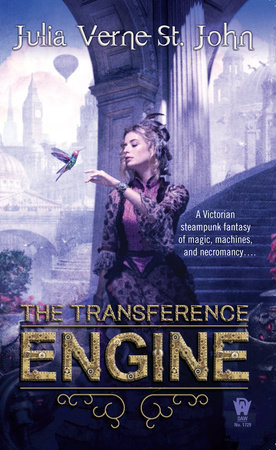 I’m delighted to have Julia Verne St. John as my special guest. She’s the author of The Transference Engine, a steampunk novel of magic and machines set in an alternate 1830s London, just out from DAW Books. Here’s the skinny on the book:
I’m delighted to have Julia Verne St. John as my special guest. She’s the author of The Transference Engine, a steampunk novel of magic and machines set in an alternate 1830s London, just out from DAW Books. Here’s the skinny on the book:Madame Magdala has reinvented herself many times, trying to escape Lord Byron’s revenge. She destroyed the Transference Engine Byron hoped to use to transfer his soul into a more perfect body and perpetuate his life eternally. A fanatical cult of necromancers continues Byron’s mission to force Magdala and Byron’s only legitimate child–Ada Lovelace–to rebuild the machine and bring Byron back.
Magdala now bills herself as the bastard daughter of a Gypsy King. She runs a fashionable London coffee salon and reading room while living a flamboyant lifestyle at the edge of polite society. Behind the scenes, she and Ada Byron King, Countess of Lovelace, use the massive library stored at the Bookview Cafe to track political and mercantile activity around the world. They watch to make certain the cult of necromancy surrounding Lord Byron, the poet king who worshipped death, cannot bring him back to life.
On the eve of Queen Victoria’s coronation in June of 1838, rumors of an assassination attempt abound. Both the Bow Street Runners and Magdala’sarmy of guttersnipe spies seek to discover the plot and the plotters. Who is behind the mysterious black hot air balloon that shoots searing light from a hidden cannon, and who or what is the target? And who is kidnapping young girls from all walks of life?
Desperately, Magdala and her allies follow the clues, certain that someone is building a new Transference Engine. But is it to bring back the dead or destroy the living?
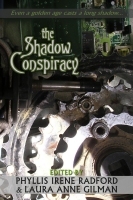 Deborah J. Ross:What was your inspiration for The Transference Engine?
Deborah J. Ross:What was your inspiration for The Transference Engine?Julia Verne St. John: The character of Madame Magdala sprang from The Shadow Conspiracy anthology published by Book View Café. As co-editor I was in on the brainstorming for the shared-world anthology. The moment we decided to insert the Bookview Café as headquarters for the spy network seeking out evidence of a conspiracy to insert life-like automata into places of power with Lord Byron jumping from human body to automaton leading the way, I knew that I had to write the story of the woman in the corner reading the tea leaves. She ended up re-inventing herself as I wrote. She does that
periodically.
DJR: How did you research The Transference Engine?
JVSJ: Like most of my historicals, I started with a biography of a prominent person in the period, in this case Queen Victoria. There was a lot of tension and family conspiracies to keep her off the throne, or to accept a full regency. She’d been raised very much in isolation and was virtually unknown to both the people and the government that an assassination attempt at her coronation seemed inevitable. From there I read up on Ada Lovelace and her mother, the Reform Act of 1834, and the development of the Leyden jar, a primitive battery. Spot research on costumes, carriages, the working principles of steam engines and clockwork devices. I start with generalities and move to specifics and let the plot dictate where to search.
DJR: Is British history a special interest of yours? What drew you to this time period?JVSJ: I’ve always been fascinated by history. I remember reading and re-reading “Queen Elizabeth and the Spanish Armada” in the fifth grade. I could almost recite the whole book verbatim. I lived in Virginia during adolescence and was force fed the American Civil War. As an adult I discovered lacemaking and fine textiles which led me to costume history and from thence into Victoriana. Madame Magdala and her outré wardrobe seemed a natural. One fascination leads to another and another.
DJR: Steampunk is very popular now. What do you think is its appeal?
JVSJ: Steampunk started as a movement among costumers and took on a life of its own. There is a romance—in the grand literary tradition not bodice rippers—with elegant costumes that flow into the craftsmanship of steam engines, weapons, and furniture. The gilt and decoration are a seamless part of functionality. And since this is alternate history, the women don’t have to stay home and flutter their fans waiting for the men to return from their adventures. The woman can scythe their way through jungles, fly dirigibles, and fix the bloody engines, all while wearing a smart costume and a corset. The corset has become an essential accessory. The stays can become weapons and tools, the garment itself is protection from unwanted advances, and support for a tired back after hacking a path through the wilderness. Equality, elegance, and adventure. What more can you ask for.
DJR: You mentioned The Shadow Conspiracy anthology as an inspiration for The Transference Engine. Have we seen the last of Lord Byron and his fanatic followers? Are
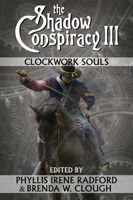 there other stories set in this world, for those of us who can’t get enough?JVSJ: The Shadow Conspiracy is now up to three volumes, the latest set during the American Civil War. In this volume we tweaked the Emancipation Proclamation of 1863, adding sentient or ensouled automata to the slaves that are freed. The standard period for Steampunk is loosely from Victoria’s coronation in 1838 to the beginning of World War I, when the internal combustion engine comes into its own and steam begins to fade out. That’s a lot of history. Expand the time period to include British colonial territories and the mythology of native peoples and the wealth of stories increases exponentially. As long as readers want more and writers are willing to provide the stories, I’ll keep editing those anthologies or writing more about Madame Magdala.
there other stories set in this world, for those of us who can’t get enough?JVSJ: The Shadow Conspiracy is now up to three volumes, the latest set during the American Civil War. In this volume we tweaked the Emancipation Proclamation of 1863, adding sentient or ensouled automata to the slaves that are freed. The standard period for Steampunk is loosely from Victoria’s coronation in 1838 to the beginning of World War I, when the internal combustion engine comes into its own and steam begins to fade out. That’s a lot of history. Expand the time period to include British colonial territories and the mythology of native peoples and the wealth of stories increases exponentially. As long as readers want more and writers are willing to provide the stories, I’ll keep editing those anthologies or writing more about Madame Magdala.DJR:Madame Magdala has such a complex relationship with the dashing but dangerous Sir Andrew Fitzandrew. Do you think their love can survive the mistrust raised between them?
JVSJ:I don’t think their relationship will survive as is. But I think they can rebuild it from the ground up. It will be hard and probably take two or three more books to find a new and stronger trust between them.
DJR:What is the most challenging thing for you about writing?
JVSJ: I find the actual typing of the story the biggest challenge. My mind is running so fast my fingers can’t keep up. Often times, I have jumped ahead two or three scenes and end up typing dialog in the wrong place, action in rooms we haven’t entered yet, working with characters I haven’t introduced yet. Thankfully we have word processors and it’s relatively simple to cut and paste, insert the right scene and setting. My rough drafts tend to be short, incomplete, out of order and ugly. Subsequent drafts straighten out the mess.
DJR: How do you approach writing a novel? Are you a plotter, a pantser or a hybrid?
JVSJ: Probably a hybrid. I have to do some prewriting. Usually I sell on a synopsis and three chapters. A synopsis needs to have a beginning, middle, and end. This is a good way to find out if a premise does make a story. It doesn’t always happen. I’d rather find this out at the synopsis level than half way through the book. Unlike some authors I need to know the ending so I have something to work toward. The synopsis is a skeleton of a story rather than a complete outline. The fun part is filling in the flesh and texture. Sometimes I have to discard the synopsis entirely half way through a book. This results in a flurry of phone calls to agent and editor who have been working behind the scenes on marketing and such based upon the original synopsis. But after thirty + books I’ve learned to make the synopsis better and workable
DJR: What else have you written?JVSJ: As Julia Verne St. John I have written only The Transference Engine. As Irene Radford, we can start with the 4 series of The Dragon Nimbus and then move on to my big five book series of Merlin’s Descendants, and two paranormal romances Thistle Down and Chicory Up. And there are also 2 small press cozy mysteries Lacing up for Murder and Plowed Under. As P. R. Frost there are 4 books in the Tess Noncoiré contemporary fantasies. And lastly as C.F. Bentley I have 3 books out in the Confederated Star Systems series, Harmony, Enigma, and Mourner. And not quite lastly, Phyllis Ames wrote a contemporary fantasy about shape shifters in Frozen in Amber. There’s more to come as well.
DJR: What's next for you? Will we see more Madame Magdala adventures?
JVSJ: My next book is a contemporary fantasy about a suburban sorceress. She’s a kitchen witch and a ballet mom with three adolescent children and an ex husband who turns out to be the Sheriff of the International Guild of Master Wizards. All in normal suburbia. I also have four

Published on August 06, 2016 01:00
August 2, 2016
Book Release Day: Thunderlord
Published on August 02, 2016 00:00
July 23, 2016
Cover Reveal: Sword and Sorceress 31
Here's a first peek at the cover by Dave Smeds. This volume, edited by Elisabeth Waters, includes my story, "Sage Mountain," which I describe as Buddhist sword'n'sorcery. With trolls. And a dragon. You can read a snippet here.
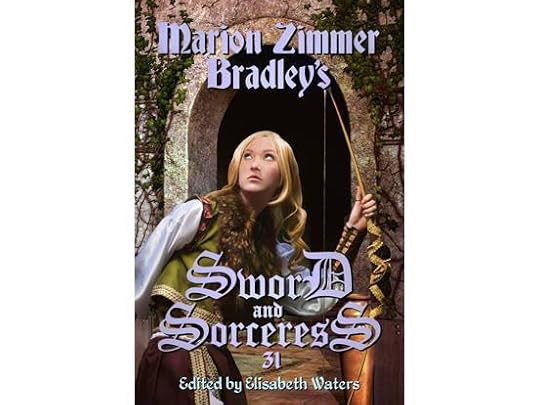
The anthology will be out in November 2016.

The anthology will be out in November 2016.

Published on July 23, 2016 01:00
July 17, 2016
It's July in the garden!
 Lacinato (dinosaur) kaleIt's been a while since I've posted about the state of our garden. We have about 1/3 acre, much of which is under cultivation. Our orchard consists of 2 pear trees, 2 apple trees (one with 5 different varieties grafted on), an an enormous grapefruit tree that survives the winters in the micro-climate created by one of our beautiful old California oaks. For a number of years, we tried a vineyard (Syrah grapes, which like this climate) but neighboring redwood trees cast too much morning shade so the Brix (sugar content) was never high enough for decent wine. Last year, we dug up and gave away the last of the vines to friends with sunnier plots. The old cordons are excellent for pole beans, small climbing squashes (like Delicata), cucumbers, and the like.
Lacinato (dinosaur) kaleIt's been a while since I've posted about the state of our garden. We have about 1/3 acre, much of which is under cultivation. Our orchard consists of 2 pear trees, 2 apple trees (one with 5 different varieties grafted on), an an enormous grapefruit tree that survives the winters in the micro-climate created by one of our beautiful old California oaks. For a number of years, we tried a vineyard (Syrah grapes, which like this climate) but neighboring redwood trees cast too much morning shade so the Brix (sugar content) was never high enough for decent wine. Last year, we dug up and gave away the last of the vines to friends with sunnier plots. The old cordons are excellent for pole beans, small climbing squashes (like Delicata), cucumbers, and the like.My husband has become enamored of the idea of "feral gardening," so many of our plants are naturalized. Chard has sprouted in a number of places; it's happiest right now at one end of the old vineyard, where the aforementioned shade provides a cooler environment during hot summer days. Purslane, amaranth, and arugula run rampant everywhere. And we will never, ever get rid of the tomatillos we were so imprudent to plant five or six years ago. (You need two to produce fruit and the result is hundreds and hundreds of seeds.) The asparagus is migrating through the lavender, which has returned the favor by invading the asparagus patch. Along the fence separating the apple and pear trees from the alley plot, volunteer scarlet runner beans are going gangbusters. I fully expect to find lacinato kale coming up in odd corners.
 Gooseberries
GooseberriesIn July, the asparagus is done for the year, as is the rhubarb, but we sometimes get a second season in the fall. Last year, the grapefruits ripened in the fall instead of winter, and from the softness of the fruits, this year may be the same.
This summer we planted a bunch of summer and winter squashes, as this is a vegetable family that doesn't play havoc with my husband's digestion. One zucchini was nibbled by wood rats, and Dave is hard at work trying to trap them with peanut butter. If the gods shine upon us, we will have corn, tomatoes, and cucumbers. Lots of pole beans, as they freeze exceptionally well. Our favorite variety is Emerite, prolific, long-seasoned, delicious.
Around the back, we have a small raspberry patch, more squashes and pole beans, some potato plants that refuse to die, gooseberries (make amazing jam), and four heat-tolerant blueberry bushes that took a while to get going but are now exuberant. Here and there, I see a few parsnips that might be harvestable after the first frost (more feral gardening -- the seeds scatter everywhere).
I keep forgetting about the herbs: an enormous catnip patch, pineapple sage, tarragon, oregano, mint. You never get rid of mint, so you might as well eat it.
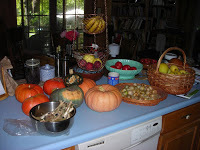 Fall harvest
Fall harvestHope your summer is as delicious!!

Published on July 17, 2016 01:00
July 12, 2016
Giveaway: Thunderlord dust jackets
Lovely friends, the folks at DAW just sent me some dust jackets for the hardcover edition of Thunderlord. The book won't be released until August 2, but I know some of you can hardly wait. So I have 6 of these covers, autographed. I'll give them out in order requested.
If you'd like one, email me through the "Contact Me" button with your mailing address. (And if you want it inscribed.) I'll pay postage in the Continental US, and we can negotiate overseas costs -- and if you felt moved to reimburse me, entirely up to you, you can do that through the "Donate" button.)
Enjoy the anticipation....
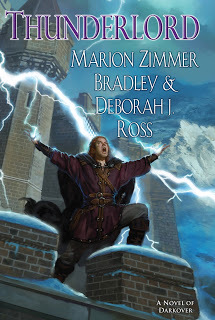

If you'd like one, email me through the "Contact Me" button with your mailing address. (And if you want it inscribed.) I'll pay postage in the Continental US, and we can negotiate overseas costs -- and if you felt moved to reimburse me, entirely up to you, you can do that through the "Donate" button.)
Enjoy the anticipation....


Published on July 12, 2016 01:00
June 25, 2016
[links] Zombie Genes and Other Wonders
In the midst of much craziness in the political world, here are a few treasures to remind us this is also a fascinating, awesomely beautiful place.
Hundreds of Genes Spring Back to Life in the Days After Death
Some of History's Most Beautiful Combs Were Made for Lice Removal
Is 'when we eat' as important as 'what we eat'?
99m-year-old lizard trapped in amber could give clue to 'lost ecosystem'

And finally, splendor from the heavens: three bright nebulae in the constellation Sagittarius.


Hundreds of Genes Spring Back to Life in the Days After Death
The majority of these zombie genes were not random in terms of function. Each of them play an important role when an animal experiences some kind of trauma or illness. For example, some genes that were ramped up are responsible for stimulating inflammation and the immune system as well as for countering stress. Some genetic activity, like a gene that’s responsible for embryonic development, baffled the scientists. Noble suspects that this gene becomes active because the cellular environment in dead bodies must somehow resemble those found in embryos.
Importantly, several genes that promote cancer also became active. This may explain why many organ donor recipients develop cancer. This tidbit of information could help scientists develop better methods of organ preservation prior to transplantation.
Some of History's Most Beautiful Combs Were Made for Lice Removal

“Most ancient combs are double-sided and have more teeth on one side than the other,” wrote Mumcuoglu and Zias. “The user would straighten his or her hair with the side that had the fewer teeth and then whisk away lice and louse eggs with the finer and more numerous teeth on the other side of the comb.”
Is 'when we eat' as important as 'what we eat'?
Eating inconsistently may affect our internal body clock or 'circadian rhythms' which typically follow a 24-hour cycle. Many nutritionally related metabolic processes in the body follow a circadian pattern such as appetite, digestion and the metabolism of fat, cholesterol and glucose. Food intake can influence our internal clocks, particularly in organs such as the liver and intestine, whilst our central clock is also regulated by the dark/light cycle which in turn can affect food intake. Chrono-nutrition involves studying the impact of nutrition on metabolic processes and how these may be influenced by and also alter circadian patterns through nutrient intake (ir)regularity, frequency and clock time.
99m-year-old lizard trapped in amber could give clue to 'lost ecosystem'

Scientists believe the chameleon-like creature was an infant when it was trapped in a gush of sticky resin while darting through a tropical forest in what is now Myanmar. The creature’s entire body, including its eyes and colorful scales, was unusually well-preserved, Stanley said. The other reptiles trapped in the amber, including a gecko and an arctic lizard, were also largely intact.
And finally, splendor from the heavens: three bright nebulae in the constellation Sagittarius.


Published on June 25, 2016 09:19
June 24, 2016
Brexit - The Morning After
 Dear friends in the U.K., I send you condolences and hugs. Prompted by Cliff Winnig, here is a quote from one of your many great writers:
Dear friends in the U.K., I send you condolences and hugs. Prompted by Cliff Winnig, here is a quote from one of your many great writers:“I wish it need not have happened in my time," said Frodo.
"So do I," said Gandalf, "and so do all who live to see such times. But that is not for them to decide. All we have to decide is what to do with the time that is given us.”

Published on June 24, 2016 09:31

